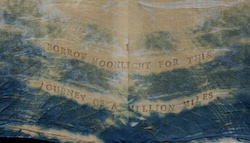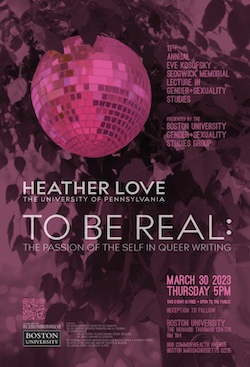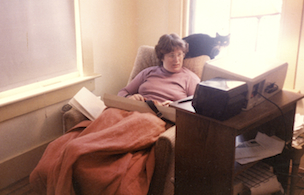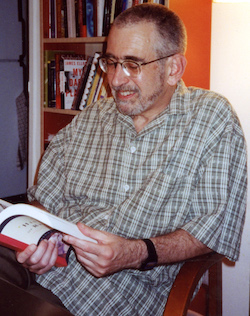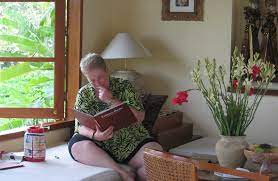BLOG
2023-2024 RECIPIENTS OF THE EVE KOSOFSKY SEDGWICK TRAVEL GRANT ANNOUNCED
The David M. Rubenstein Rare Book & Manuscript Library at Duke University has announced the recipients of this year’s Eve Kosofsky Sedgwick Travel Grants. Annual travel grants to support research using the Eve Kosofsky Sedgwick Papers at the Sallie Bingham Center are funded by the Eve Kosofsky Sedgwick Foundation and administered through Duke University’s Rubinstein Rare Book & Manuscript Library. We congratulate this year’s grant recipients and look forward to their work.
The 2023-2024 grant recipients and project titles are:
Matilde Manara, Postdoctoral Fellow, Collège de France, “Proustmania! Reading, writing, sewing Proust today.”
Christina Olivares, Ph.D. candidate, Department of English Education, Teachers College at Columbia University, “Reparative Gestures/Queering Education: Eve Kosofsky Sedwick’s pedagogical practices and James Sears’ research in adolescent education.”
Evan Pavka, Faculty, Department of Art & Art History, Wayne State University, “Reconstructing ‘Queer Space.’”
RELATED - GRANTS
2023 HONORING EVE LECTURE AT BOSTON UNIVERSITY
The 11th annual Boston University Eve Kosofsky Sedgwick Lecture in Gender & Sexuality Studies will be delivered by Dr. Heather Love at 5pm on March 30, 2023. Dr. Love’s talk is titled “To Be Real: The Passion of the Self in Queer Writing.” The talk will be given at Boston University and recorded for future viewing.
Heather Love is Professor of English at the University of Pennsylvania. She received her A.B. from Harvard and her Ph.D. from the University of Virginia. She is the author of Feeling Backward: Loss and the Politics of Queer History (Harvard) and the editor of a special issue of GLQ on Gayle Rubin (“Rethinking Sex”) and the co-editor of a special issue of Representations(“Description Across Disciplines”). Underdogs: Social Deviance and Queer Theory (University of Chicago Press) came out in Fall 2021.
RELATED - EVENTS
DEADLINE APPROACHES FOR THE 2023-2024 EVE KOSOFSKY SEDGWICK TRAVEL GRANT
The application deadline for the 2023-2024 Eve Kosofsky Sedgwick Travel Grant, funded by the Eve Kosofsky Sedgwick Foundation and supported by the Sallie Bingham Center for Women’s History and Culture, is Friday, February 24, 2023 at 6:00 pm EST.
This opportunity offers up to $1500 to support research using the Eve Kosofsky Sedgwick Papers. In addition to supporting academic research aimed at producing publications and dissertations, these grants will support a wide range of other creative projects such as educational initiatives, exhibitions, films, multimedia products, and other artistic works. Sedgwick Travel Grant recipients will be asked to submit a brief report of their grant-supported activities at the conclusion of the grant cycle.
To apply for the Eve Kosofsky Sedgwick Travel Grant, visit the Rubinstein Library’s page.
RELATED - GRANTS
JONATHAN GOLDBERG, 11 JUNE 1943–9 DECEMBER 2022
Jonathan Goldberg, a dear friend of Eve Kosofsky Sedgwick, passed away on December 9th following a long illness. As detailed in his obituary, published on Sunday, December 18, in the New York Times, Goldberg was a highly influential and prolific scholar working in “the fields of early modern British literature, poststructuralist literary studies, and LGBTQ studies and queer theory.” Among his many other accomplishments, Goldberg made invaluable contributions to the dissemination and evaluation of Sedgwick’s work.
When Sedgwick came to Duke University in 1988, Goldberg was on the faculty of Johns Hopkins University, but he was coming frequently to Duke to visit his partner, Michael Moon, who had joined the Duke faculty the year before. Sedgwick soon became close friends with both Moon and Goldberg. They learned from each other’s work and together participated in creating and editing Series Q at the Duke University Press, which describes the series as having brought “a theoretical and interdisciplinary lens to gay and lesbian studies, approaching questions of sexuality from a queer angle.”
Their friendship continued after Sedgwick moved to the Graduate Center of the City University of New York, while Moon and Goldberg moved to Emory University. When Sedgwick’s own illness became incurable, she asked Goldberg to be her literary executor. Following her death in 2009, Goldberg undertook the difficult task of editing her more recent unpublished manuscripts, some of which existed in multiple versions, into a coherent volume of essays (The Weather in Proust, Duke University Press, 2011). He also contributed an essay of his own to a recent collection of essays about Sedgwick’s work (Reading Sedgwick, edited by Lauren Berlant, Duke University Press, 2019). One of his last projects was a monograph assessing the critical response, following her death, to Sedgwick’s work (Come As You Are, After Eve Kosofsky Sedgwick, punctum books, 2021); this book also contains a previously unpublished talk of Sedgwick’s, “Come As You Are,” which Goldberg describes as representing “a significant bridge between her earlier and later work, sharing with her book Tendencies the ambition to discover the ‘something’ that makes queer inextinguishable.”
RELATED - GOLDBERG
2023-2024 EVE KOSOFSKY SEDGWICK TRAVEL GRANT APPLICATIONS ARE NOW OPEN
Annual travel grants to support research using the Eve Kosofsky Sedgwick Papers at the Sallie Bingham Center are funded by the Eve Kosofsky Sedgwick Foundation and administered through Duke University’s Rubinstein Rare Book & Manuscript Library. The 2023-2024 grant application cycle is now open.
To apply for the Eve Kosofsky Sedgwick Travel Grant, visit the Rubinstein Library’s page.
Please note that the Eve Kosofsky Sedgwick Travel Grant is administered solely by the Rubinstein Library. Queries to the Eve Kosofsky Sedgwick Foundation about the travel grant will not receive a reply.
